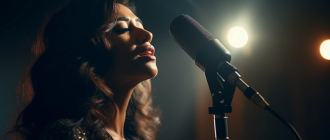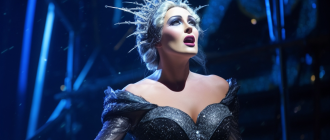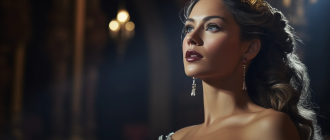Discover the mesmerizing world of opera and the legendary performances of famous male opera singers 🤩 From tenors to basses, experience the power of these voices
Opera has enthralled audiences for centuries with its breathtaking arias, captivating stories, and remarkable vocal talents. At the center of this art form are the opera singers themselves, whose refined technique, expressive range, and sheer power can mesmerize listeners. Among these talented performers, certain male opera singers have risen to fame through their iconic portrayals, peerless voices, and lasting impacts on the genre. In this article, we’ll explore some of history’s most influential male opera singers, delving into their origins, signature roles, vocal qualities, and enduring legacies.
The Leading Male Voice: The Tenor
The operatic tenor is often considered the leading male voice type. Tenors typically sing the heroic protagonist or impassioned lover, showcasing their bright, powerful high notes and agile range. Throughout opera’s history, legendary tenors have emerged whose names became virtually synonymous with the art form.
For instance, the great Italian tenor Enrico Caruso (1873-1921) pioneered the large-scale recording of opera and helped bring it to new audiences across the globe. Caruso’s rich, ringing tone and superb technique dazzled during his 25-year career. He excelled in the Italian repertoire, delivering legendary performances in Verdi and Puccini operas like Rigoletto, La Traviata, and Tosca at famed opera houses including La Scala and the Metropolitan Opera. Caruso’s 1902 Covent Garden debut as the Duke in Rigoletto helped cement his international stardom. Today, Caruso remains one of the most recognizable voices in classical music. His iconic 1904 recording of “Vesti la giubba” from Pagliacci continues inspiring performers and listeners alike.
Similarly, Swedish tenor Jussi Björling (1911-1960) was revered for his beautiful voice and moving dramatic interpretations. Making his operatic debut at just 18, Björling triumphed in Italian and French roles and recorded extensively. His velvety, expressive voice left a permanent imprint on generations of listeners. Björling’s renditions of arias like “Nessun dorma” remain iconic benchmarks against which today’s tenors are measured. Pavarotti himself considered Björling the “greatest tenor of the century.” Björling’s nuanced portrayals in Puccini works like Manon Lescaut, Tosca, and Madama Butterfly display the emotional depth he could convey through sheer vocal mastery.
The Three Tenors Phenomenon – Luciano Pavarotti, Plácido Domingo, José Carreras – Tenors of All Time
No discussion of celebrated tenors would be complete without the “Three Tenors”: Luciano Pavarotti, Plácido Domingo, and José Carreras. These larger-than-life performers began collaborating in the 1990s, showcasing their diverse strengths while also promoting opera to wide audiences. Italians Pavarotti (1935-2007) and Carreras (b. 1946) and Spaniard Domingo (b. 1941) sang in a range of styles, from Verdi to Broadway hits, captivating millions with their unforgettable live concerts and best-selling albums. Though each tenor has unique vocal qualities, their shared commitment to excellence and ambassadorship established them as musical icons in the world of opera.
Pavarotti possessed an instantly recognizable, clarion voice capable of gleaming high notes. Though he sang roles like Rodolfo in La Bohème and Cavaradossi in Tosca, Pavarotti became best known for his renditions of operatic arias like “Nessun dorma” which showcased his peerless voice. Meanwhile, Domingo boasted an expressive tone, seamless range, and consummate artistry that allowed him to sing over 150 roles and counting. The remarkable longevity of Domingo’s career illustrates his careful technique and versatility. Carreras overcame leukemia to return thrilling audiences with his elegant, impassioned voice exemplified in the verismo roles of Verdi and Puccini. Through their collaborations and individual talents, the Three Tenors permanently expanded opera’s popularity and left an indelible legacy as greatest tenors of the 20th century.
Baritones as Leading Male Opera Singer
While tenors often garner the spotlight, baritones also play critical operatic roles. With warm, flexible voices spanning higher and lower registers, baritones may portray nobility, seduction, or menace. American baritone Leonard Warren (1911-1960) displayed his vocal splendor during over 500 Metropolitan Opera performances between 1938 and 1960. Warren was celebrated for his Verdi portrayals, especially the title character in Rigoletto, which contains the timeless aria “La donna è mobile.” Likewise, Italian baritone Piero Cappuccilli (1926-2005) was adored for his interpretations of Verdi and Puccini. Dubbed the “new Caruso,” Cappuccilli sang with passion and sensitivity until vocal issues ended his career in 1983. His performances as Giorgio Germont in La Traviata at La Scala and the Met Opera set new standards for the role.
Another exceptional baritone, German-Austrian Dietrich Fischer-Dieskau (1925-2012), left an indelible mark through his over 500 lieder and opera recordings. While renowned as a lieder interpreter, Fischer-Dieskau also tackled operatic parts like the sinister villains in Berg’s Wozzeck and Verdi’s Macbeth. His mellifluous tone and insightful artistry have become benchmarks for generations of baritones. Through their memorable portrayals, baritones like Warren, Cappuccilli, and Fischer-Dieskau have proven themselves captivating operatic leads in their own right.
The Power of the Bass Voice
The bass voice underpins the opera choir with impressive depth and power. Russian bass Feodor Chaliapin (1873-1938) left an indelible mark through his vivid stage portrayals and booming yet expressive voice. His dramatic talents brought verisimilitude to roles like Mephistopheles in Gounod’s Faust and Boris Godunov in Mussorgsky’s opera. Meanwhile, Italian bass Ezio Pinza (1892-1957) cemented his legacy by starring in over 750 Metropolitan Opera shows between 1926 and 1948. Pinza’s elegant phrasing and vocal agility helped humanize roles like Mozart’s charming Don Giovanni.
Other exceptional basses include Finnish singer Martti Talvela (1935-1989), whose booming voice and imposing presence commanded the stage in Wagner works like The Flying Dutchman. Serbian singer Boris Martinović (b. 1933) brought his basso profundo voice to over 60 roles during his Metropolitan Opera tenure from 1959-1997. And Austrian singer Kurt Moll (b. 1938) used his velvety bass-baritone to vividly portray villains like Hagen in Wagner’s Götterdämmerung but also endearing characters like Mozart’s Papageno. Both Chaliapin and Pinza’s commanding yet nuanced vocal interpretations continue inspiring modern bass singers to maximize their instruments’ capabilities and dramatic potential.

Global Opera Talents
While opera origins trace back to Italy, extraordinary male singers have emerged worldwide. For example, Welsh tenor Alfie Boe (b. 1973) possesses a flexible, crisp voice able to crossover classical and popular genres. Boe has starred on London’s West End and at the Metropolitan Opera, also achieving chart-topping albums and singles. His rendition of “Bring Him Home” as Jean Valjean in Les Misérables displays his clarion tone and excellent technique.
Maltese tenor Joseph Calleja (b. 1978) impresses with his warm, Italianate sound and clarion top notes. Calleja advocates for opera’s future, mentoring young singers and broadening the repertoire. His thrilling portrayal of Macduff in Verdi’s Macbeth at the Met Opera announced his arrival on the international stage in 2007.
And Peruvian tenor Juan Diego Flórez (b. 1973) is famed for his electrifying coloratura performances and gleaming voice capable of rapid, intricate passages. Flórez has specialized in bel canto roles like Count Almaviva in Rossini’s The Barber of Seville, showcasing his agile, bright voice to full effect. Through their talents, Boe, Calleja, and Flórez represent opera’s expanding diversity and globalization.
Famous American Male Opera Singers
While European countries like Italy and Germany may be most associated with opera’s origins, the United States has cultivated extraordinary male opera talents. One legendary American tenor was Mario Lanza (1921-1959), who parlayed his powerful, emotional voice into Hollywood film fame and best-selling recordings. Though his career was tragically cut short, Lanza’s spotlight helped inspire future generations of American opera singers.
Another exceptional American tenor was Richard Tucker (1913-1975), whose fiery, clarion voice powered over 600 Metropolitan Opera performances between 1945 and 1975. Tucker tackled robust Italian and French heroic roles as well as lyrical parts like Rodolfo in Puccini’s La Bohème. Through his artistry, Tucker demonstrated that America could produce tenors to rival the great European opera stars.

Famous Male Opera Singers & The Best Tenors of All Time
Certain male opera singers have risen to become the stuff of legend, their voices still recognized generations later. For instance, Italian tenor Enrico Caruso (1873-1921) pioneered recording technology to bring opera to the masses internationally. His 250+ recordings feature his instantly recognizable, rich voice navigating the emotional peaks and valleys of opera’s great tenor roles. Fellow Italian Beniamino Gigli (1890-1957) enchanted global audiences in the early 20th century with his honeyed tone and sensitive artistry. During his prime, Gigli was nicknamed “Caruso Secondo” for talent rivaling even the great Caruso himself.
Meanwhile, Italian tenor Franco Corelli (1921-2003) built his reputation on gleaming top notes and heart-on-sleeve intensity. Corelli tackled roles like Cavaradossi in Puccini’s Tosca with an electrifying, visceral performance style. Though controversial for his unsubtle approach, Corelli’s sheer vocal splendor and charisma left listeners spellbound. These tenors showcase how the Italian bel canto style produces legends whose voices withstand time’s test.
Legendary Great Male Opera Singers
Beyond legendary tenors, baritones and basses have also left indelible marks in opera history as the best male opera singers. Renowned Italian baritone Titta Ruffo (1877-1953) mesmerized audiences with his fiery verismo performances of verismo works like Pagliacci. Another Italian baritone, Giuseppe Taddei (1916-2010), displayed versatile artistry over his six-decade career, excelling in both comic and dramatic roles from Mozart to Verdi. And Ukrainian bass Boris Christoff (1914-1993) stunned listeners with his cavernous low notes and magnetic stage presence. These opera singers of all time demonstrate that male opera singers across all voice types have achieved immortal fame through their outstanding talents.
The full breadth of extraordinary male opera singers throughout history could fill volumes. However, certain special artists like Caruso, Gigli, Corelli, Ruffo, Taddei, and Christoff endure as touchstones demonstrating Italian bel canto vocal mastery. Their recorded legacy allows modern listeners to still experience their captivating sounds and understand why their fame persists generations later. For both seasoned opera fans and newcomers, exploring these icons offers rich insights into the heights male voices can achieve in opera’s theatre.

Contemporary Opera Stars – Anthony Roth Costanzo, Piotr Beczała, Jonas Kaufmann
As opera progresses into the 21st century, male singers continue reinvigorating the art form. American countertenor Anthony Roth Costanzo (b. 1982) excels in daring productions that blend opera, dance, and theater. Costanzo’s multi-octave voice shifts seamlessly from ethereal highs to powerful lows, allowing him to play sexually ambiguous male heroines or villainous sorcerers with equal skill.
Meanwhile, tenors like Poland’s Piotr Beczała (b. 1966) and Germany’s Jonas Kaufmann (b. 1969) have emerged as compelling contemporary interpreters. They imbue classic roles with fresh nuance while also premiering new works that could become future masterpieces. Beczala’s ardent voice shines in romantic leads like the Duke of Mantua in Verdi’s Rigoletto. Kaufmann uses his burnished, baritonal tenor to portray tortured characters like Andrea Chénier as grippingly as lighter roles like Don José in Carmen. Through their daring artistry, modern male opera singers continue pushing creative boundaries.

Exploring Opera’s Rich History
Of course, this sampling barely scratches the surface of opera’s great male singers. From 19th century artists like Giovanni Rubini and Antonio Tamburini to trailblazers who opened doors for African-American artists, such as Roland Hayes and Paul Robeson, scores of extraordinary talents have left lasting legacies in opera world. Each generation produces compelling new voices to reinvigorate cherished standards and reinvent the genre.
However, certain extraordinary artists’ names remain etched in opera’s pantheon, their immortal voices continuing to resonate through time. Italian tenor Tito Schipa (1888-1965), known as “the angel voice,” left behind over 600 recordings featuring his honeyed tone and articulate phrasing. Voluminous-voiced Italian tenor Franco Corelli (1921-2003) built a 35-year Metropolitan Opera career through his gleaming top notes and charismatic stage presence. Versatile American baritone Sherill Milnes (b. 1935) portrayed over 60 roles encompassing buffo to Verdi villains.
For devoted aficionados or newcomers to opera’s magic, male singers like Pavarotti, Björling, and Caruso remain essential to opera’s rich heritage. Exploring new rising talents as well as iconic voices of the past offers endless opportunities to appreciate opera’s central instrument – the captivating male voice.





